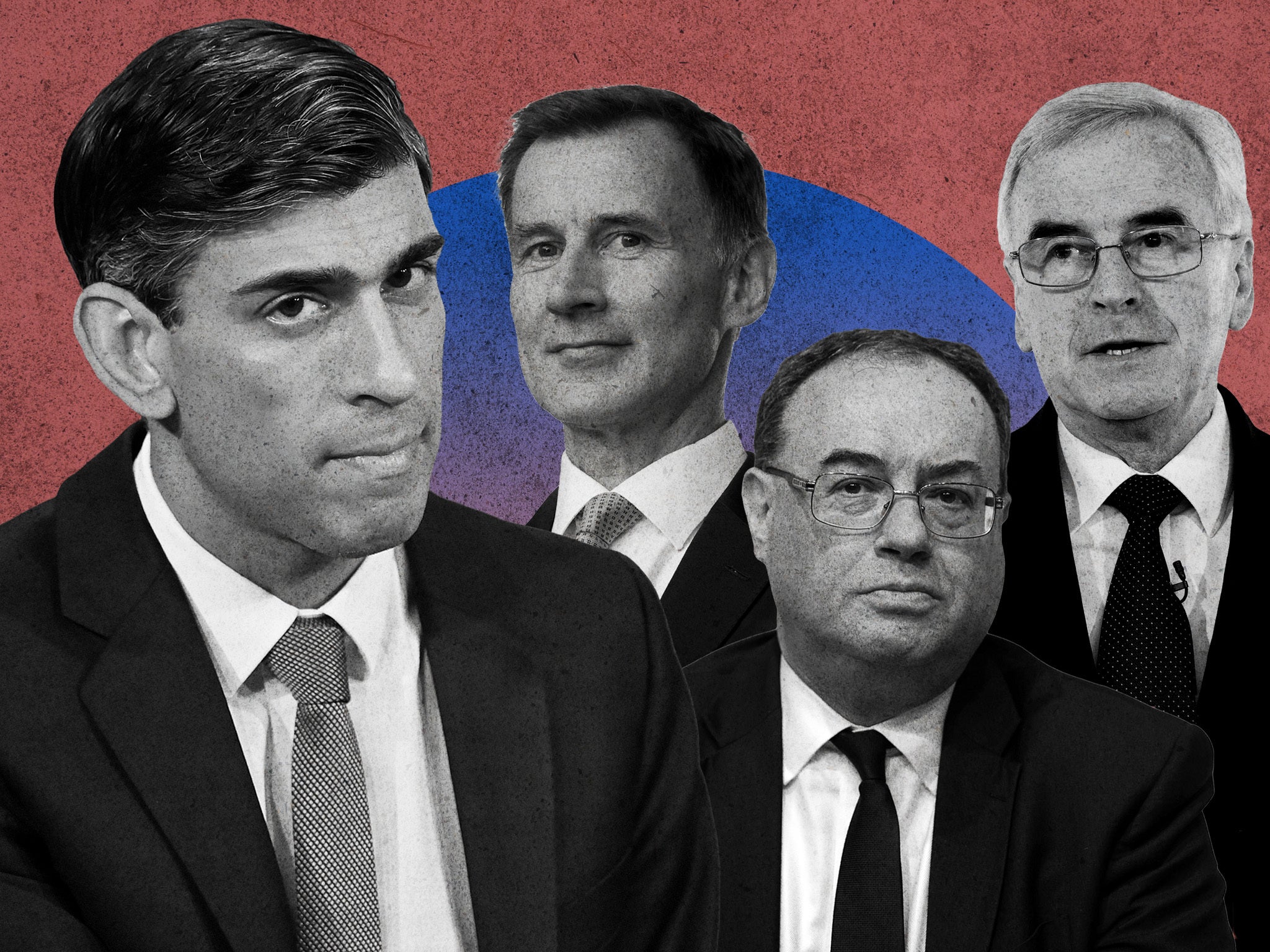It’s politicians and policymakers who are the real supervillains in the supermarket price war
Food prices are a global problem but our PM, politicians and monetary policymakers must bear the blame for making Britain’s worse than they otherwise might be – not the supermarkets, writes James Moore


Your weekly shop has gone up far too much. We are looking at the supermarkets, making sure they are behaving responsibly and fairly.”
Is that a bird? Is it a plane? No, it’s Super Rishi, riding to the rescue of your weekly shop and biffing the baddies in the supermarkets’ boardrooms. He has his Avengers assembled: chancellor Jeremy Hunt, Bank of England governor Andrew Bailey and, unexpectedly, Labour’s John McDonnell, at his side.
With inflation up again and the Bank of England belatedly putting their foot on the interest rate throttle with a half-point rate rise to 5 per cent, this lot badly needs someone to distract from their own policy failings.
Someone has to be found to take the fall. That someone is the supermarkets.
But we need to throw a few facts into the narrative. Because, in these eye-wateringly expensive times, this is a cheap shot.
Why they’re taking it is easy enough to see. Who doesn’t look at Tesco’s billion-pound-plus profits and the admittedly-unconscionable £5m Sainsbury’s kicked over to its CEO last year and wince? Especially when we look at our weekly shopping bill receipts and what’s been happening to them.
Food prices have risen by a fifth. Some people can barely afford to eat. Ergo, the grocers must be at it. But no one was complaining about food prices and supermarkets profiteering during the pandemic. Not really. No one made much of a fuss about their earnings in the decade before that either.
The reason for this is that the supermarket sector is a highly competitive one. The emergence of Aldi and Lidl as forces has squeezed their profit margins. Time was when they were sitting pretty on 5 per cent, sometimes even more. Those numbers look like witchcraft today when margins are down below 3 per cent. By comparison, tech CEOs would get laughed out of Silicon Valley for anything less than 30 per cent.
I’m not saying it’s a bad idea to put pressure on these businesses, especially if it makes them work harder to keep prices down. You may recall the battle of the baked bean tin, when they were falling over each other to see how low they could go. We could certainly do with a bit of that today.
So I’m not opposed to putting heat on the supermarkets even if their margins are low. It wouldn’t hurt to push them lower. That would be a worthwhile exercise.
But if you take a hard look at the data, it simply does not justify casting Sainsbury’s as a supervillain like Sabretooth, Asda as the Abomination and Tesco as Thanos. It just doesn’t stack up.
If you want to know who the real food price baddies are, I give you the would-be heroes of the day — Sunak and his sidekicks.
It is Bailey’s job to control interest rates. He’s on the taxpayer’s ticket and he earns half a million quid. But he’s not been doing his job very well which helps explain why he’s so keen to divert attention from that fact.
Sunak is, meanwhile, a fully paid-up Brexiteer, despite what Boris Johnson would have you believe, while Hunt has become a convert. Brexit has loaded costs on to British businesses, including Britain’s grocers, costs which they will inevitably pass on. They are not charities. If they didn’t do this, they would be out of business.
The seamless flow of food from the continent has been interpreted by customs checks, extra fees, delays and enough red tape to suffocate half the nation. The best of it is, there is more to come. Construction on the huge trade wall Sunak, Hunt and their friends have erected between our flailing economy and where we import our food from hasn’t yet been completed. More costs are coming. Higher prices are on the way. It is, I am afraid, the fault of these men.
Want more bad news? Spain’s recent dodgy harvest made some fruit and veg feel as expensive as caviar. There was a domestic alternative that might have alleviated the problem: businesses in the south that use polytunnels to grow the same produce year-round. But they are energy intensive and they were left out of the government’s support scheme, which made their businesses uneconomic.
In fact, whenever you look at our horrible food prices you find the rotting tendrils of policy failure, bad ideas and outright incompetence. It is shameful. We have every right to be furious. Don’t imagine I’m giving the opposition a pass here either. Labour’s policies in this area aren’t any better. It doesn’t have any good ideas when it comes to the wall between us and the world’s biggest market.
We food shoppers have been failed. We have been badly let down. But this is mostly on the supermarkets’ chief critics – our political and monetary policy masters – not the supermarkets.






Join our commenting forum
Join thought-provoking conversations, follow other Independent readers and see their replies
Comments